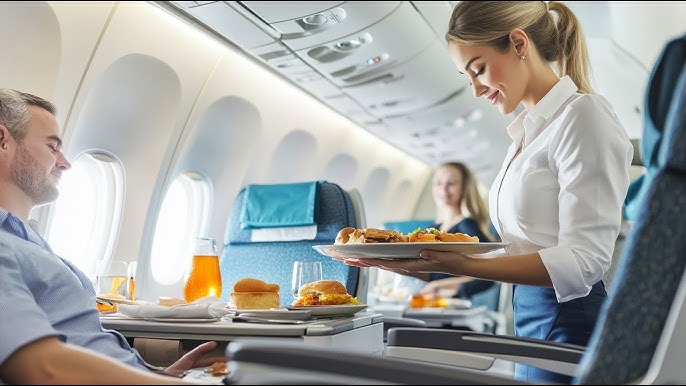In the world of air travel, business class and first-class services stand out as the epitome of luxury, offering passengers an experience designed to cater to their every need. One of the most pivotal aspects of this premium travel experience is inflight catering, which plays a crucial role in distinguishing business and first-class from economy. Catering in these cabins goes beyond just providing meals—it is an integral part of the overall experience, enhancing comfort, convenience, and luxury. This comparative study examines how inflight catering enhances business class and first-class services, with a particular focus on its role in shaping the passenger journey. Furthermore, we will explore the influence of private jet catering los angeles and how it is adapting to the increasing demand for exclusivity and personalization.
1. The Importance of Inflight Catering in Premium Cabins
Inflight catering serves as a key element in the overall air travel experience for high-paying passengers in business and first-class cabins. The quality and presentation of food can elevate an airline’s reputation, contribute to customer satisfaction, and encourage brand loyalty. In both cabins, food and beverage offerings are not merely about filling the passengers’ hunger—they are designed to create a memorable experience, often reflecting the airline’s commitment to luxury and service.
1.1 Creating an Experience of Comfort and Relaxation
Premium passengers are typically looking for comfort and relaxation, and gourmet meals serve as a significant part of that experience. In business class, meals are often served in courses, with options ranging from fine-dining inspired meals to healthier choices, giving passengers a variety of options to suit their tastes. In first class, this goes a step further, with ultra-exclusive menus that rival five-star restaurant dining. Thoughtfully prepared meals are presented in elegant packaging, often with curated wines, high-end spirits, and gourmet coffee, ensuring that passengers feel pampered throughout their journey.
1.2 Personalized and Tailored Service
An essential aspect of inflight catering in both business and first-class is personalization. Airlines offering these premium services cater to specific passenger preferences, including dietary requirements and food allergies. Customization ranges from tailored menus based on personal preferences to specialized in-flight snacks or meals upon request. In contrast to economy class, where meal offerings are limited, business and first-class passengers expect meals that cater to their individual tastes, making personalized inflight catering a hallmark of these services.
2. The Key Differences Between Business Class and First-Class Catering
While both business and first-class passengers receive exceptional inflight catering, there are notable differences in terms of the quality and exclusivity of the food and drink offerings.
2.1 Menu Variety and Sophistication
Business class meals typically include a well-curated menu with a range of international and regional options, from gourmet dishes to healthy choices, all designed with quality and freshness in mind. The meal presentation is elegant but practical, designed to suit the constraints of the cabin.
First-class catering takes this experience to an entirely different level, offering an expanded selection of sophisticated dishes, often crafted by renowned chefs or in collaboration with luxury restaurants. Menus can feature delicacies such as caviar, lobster, or wagyu beef, accompanied by a wide variety of premium beverages, including top-tier wines, Champagne, and spirits. The use of locally sourced, organic ingredients also distinguishes first-class meals, adding an extra layer of luxury and attention to detail.
2.2 The Impact of Dining Experience on Service Perception
First-class passengers expect more than just food—they expect an experience. First-class catering often includes a multi-course dining experience, where each course is carefully paired with wine or champagne. The meals are prepared and served with a level of precision, often accompanied by personalized service from attendants who anticipate the passengers’ needs. The importance of providing exceptional food and drink options in first class goes beyond the meal itself, as it creates an experience that aligns with the exclusive nature of the service.
In business class, while the service is still top-notch, the dining experience is typically more casual. Though the meals are still luxurious and the service is excellent, it lacks the sense of exclusivity that defines first-class dining.
3. The Evolution of Private Jet Catering and Its Influence on Commercial Air Travel
As private air travel continues to grow in popularity, the demand for high-end inflight catering services has also expanded. Private jet catering in Los Angeles is a prime example of this trend. Luxury private jets often boast customized menus created to suit the tastes and preferences of the passengers, from rare delicacies to bespoke dishes crafted by renowned chefs. This level of exclusivity has set new standards for premium catering, influencing how commercial airlines approach their inflight dining services.
3.1 Customization and Exclusivity
Private jet catering is all about delivering a bespoke experience, with meals specifically designed for individual passengers. This level of customization can extend to every detail, from the choice of wine to the presentation of the food, ensuring that no two meals are alike. Commercial airlines, particularly those serving business and first-class passengers, have increasingly adopted these principles of personalization and exclusivity, incorporating them into their own catering services.
3.2 Trends Influenced by Private Jet Catering
Airlines are now turning to private jet catering trends to enhance their premium services. Many airlines have begun to collaborate with Michelin-starred chefs and high-end restaurants to elevate their meal offerings, much like private jet caterers. Similarly, the rise in demand for organic, sustainable, and health-conscious meals in private jet catering has influenced commercial airliners to adapt their menus to cater to a more health-conscious clientele.
Additionally, the use of locally sourced ingredients and the incorporation of regional flavors into in-flight meals are becoming more common, particularly in first-class services. These trends, influenced by private jet catering, are seen as essential for delivering a more luxurious and personalized experience for discerning travelers.
4. Sustainability and Innovation in Premium Inflight Catering
Sustainability is an increasingly important consideration in the airline industry, and inflight catering is no exception. Passengers in both business and first-class expect not only high-quality meals but also an environmentally conscious approach to food sourcing, packaging, and waste management.
4.1 Eco-Friendly Initiatives in Catering
Airlines are adopting eco-friendly practices in their catering operations, such as using biodegradable packaging, minimizing plastic usage, and sourcing sustainable ingredients. These efforts are increasingly reflected in business and first-class meals, where locally sourced, organic produce is featured prominently.
For premium services like business and first-class, reducing the environmental impact while still providing luxury is a challenge that airlines are meeting head-on. Some airlines have even partnered with green initiatives to reduce food waste by donating excess meals to local charities or reworking meal preparation processes to reduce the carbon footprint.
4.2 Innovative Catering Solutions
Innovation in inflight catering is crucial for enhancing the luxury travel experience. Airlines are now incorporating more high-tech solutions, such as personalized meal ordering systems that allow passengers to choose from a variety of meal options before their flight. For first-class passengers, some airlines even offer dine-on-demand service, where meals are served whenever the passenger prefers, rather than following a fixed meal schedule.
In business class, the growing trend of providing healthier meal options is also influencing the menu choices, with airlines offering lighter, nutritionally balanced meals. From vegan and gluten-free offerings to locally-inspired meals, the goal is to cater to a wide range of dietary preferences and ensure that passengers enjoy a balanced, nutritious meal at 35,000 feet.
Conclusion: The Future of Inflight Catering in Premium Services
The role of inflight catering service in business and first-class services cannot be understated. It is not just about food—it is about creating an experience that elevates the entire journey. As the demand for personalized, high-end experiences grows, airlines will continue to innovate, offering gourmet meals, curated wine selections, and bespoke services designed to meet the unique needs of their premium passengers. With private jet catering setting the bar for exclusivity and quality, commercial airlines are increasingly embracing these luxury practices, ensuring that business and first-class passengers enjoy a truly exceptional inflight dining experience. From sustainability to personalization, the future of premium inflight catering looks brighter than ever, as airlines strive to provide travelers with unforgettable meals at every altitude.
Also read: Enhance Customer Support & Streamline Operation



